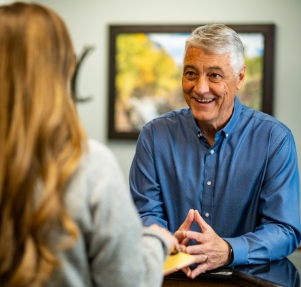Are Your Teeth Impacted?
When you have an impacted tooth, it means the tooth can’t break through your gums. This is most common with wisdom teeth but can happen with other teeth as well, such as cuspid teeth. Cuspid teeth – known as canine teeth, are more problematic than wisdom teeth when they are impacted because they serve an important purpose. Your cuspid teeth are the first ones that touch when you close your jaws, so they are the foundation for a proper bite.
Dr. Austin Ivey usually suggests that patients who reside in and around the Centennial, CO areas have their wisdom teeth removed if they become impacted. However, every effort is made to force impacted canines to erupt to form a proper bite and dental arch. Impacted canine teeth are common, but if they haven’t come down correctly, it’s recommended you contact Dr. Ivey right away.
Painful Impacted Canines
Every patient who suffers from this condition experiences a different level of discomfort. Sometimes there is adequate space for the tooth to erupt, but it’s just being stubborn and not doing so on its own. In other cases, a combined effort between an oral surgeon and an orthodontist can create enough space for the tooth to erupt, and then they can help guide the tooth out. The process is straightforward and nothing to be concerned about, and we’ll cover it later on in more detail. Just know the process of creating space involves wearing braces for a period of time after the surgery.
Early Discovery Can Lead to Easier Treatments
There are times when you can just wait for impacted canines to erupt on their own, and there are times when you need to take immediate action. If your child is around age 11 or 12, there’s still some time for the impacted tooth to erupt on its own. But once they turn 13 or 14, the chances of the tooth erupting without intervention decrease significantly. And if you’ve dealt with impacted canines into your 20s, 30s, or even 40s, there is no chance of the tooth erupting on its own. At this point, Dr. Ivey will likely recommend that his patients have their impacted canines extracted. Your orthodontist will also help make the determination if your canine needs this special type of treatment.
Treating impacted canines early in life is easier and recommended for patients. Having x-rays taken around the age of seven gives your dentist a good idea of the patient’s teeth count and whether there could be impacted canines. If your dentist sees something concerning, you may be referred to a specialist for a second opinion.
How the Impacted Tooth Exposed
Some impacted teeth require a more complex treatment plan; others are simpler. If you require a bracket, your oral surgeon will work in conjunction with an orthodontist to bring the impacted tooth to the surface. Typically your orthodontist places braces on your upper and lower teeth to make room for the impacted tooth. After enough space has been created, Dr. Ivey surgically lifts the gum that is blocking your canine teeth. Often both the baby tooth and the adult tooth are blocked, so first the baby tooth will have to be removed. After the impacted adult canine – or eyetooth, is exposed, your oral surgeon will adhere an orthodontic bracket to the impacted tooth. The bracket is a tiny gold chain that is temporarily attached to an orthodontic wire. You will meet with your orthodontist 1 to 2 weeks later so they can start pulling on the impacted canine.
In some cases, the newly exposed canine tooth is left uncovered, and Dr. Ivey will suture the gums high above the tooth, and over time the gum descends into its original place, leaving only the small chain. Within a week or two, you will go back to the orthodontist, who attaches a rubber band to the gold chain that slowly pulls the impacted tooth into place. The entire process takes several months to complete because the goal is to expose the tooth, not remove it.
This is one of the most straightforward procedures Dr. Ivey does, and since you’ll likely be under IV sedation, you won’t feel anything. The procedure can take up to 45 minutes, and Dr. Ivey will thoroughly explain the details of what he’s going to do before beginning.
You won’t experience any discomfort for the duration of your procedure, but it is likely that you will experience some bleeding, swelling, and discomfort for a few hours afterward and the following few days. However, the after-effects are usually so minimal that an over-the-counter pain reliever of choice will sufficiently take care of any discomfort you may have. Just be sure to take it easy and be mindful of the foods you eat, and you’ll be back to normal within a few days or so.
Dr. Ivey is Here for You
Dr. Ivey and our team want to create the best experience you’ve ever had with a dental procedure from the time you walk through our door. Impacted canines are truly nothing to worry about, especially when you place your trust in Dr. Ivey. He will provide you with all the information you need to know and answer every one of your questions before scheduling the procedure. If you are not comfortable with something, then he will not proceed.
Ivey Oral & Facial Surgery works with patients who have impacted canines regularly. There’s nothing we haven’t seen, so you can rest assured your dental health is in great hands. If you live in the areas surrounding Centennial, CO, don’t hesitate to call or text us at (303) 493-1933 to schedule a consultation if you are concerned about any issues that are affecting your dental health.







